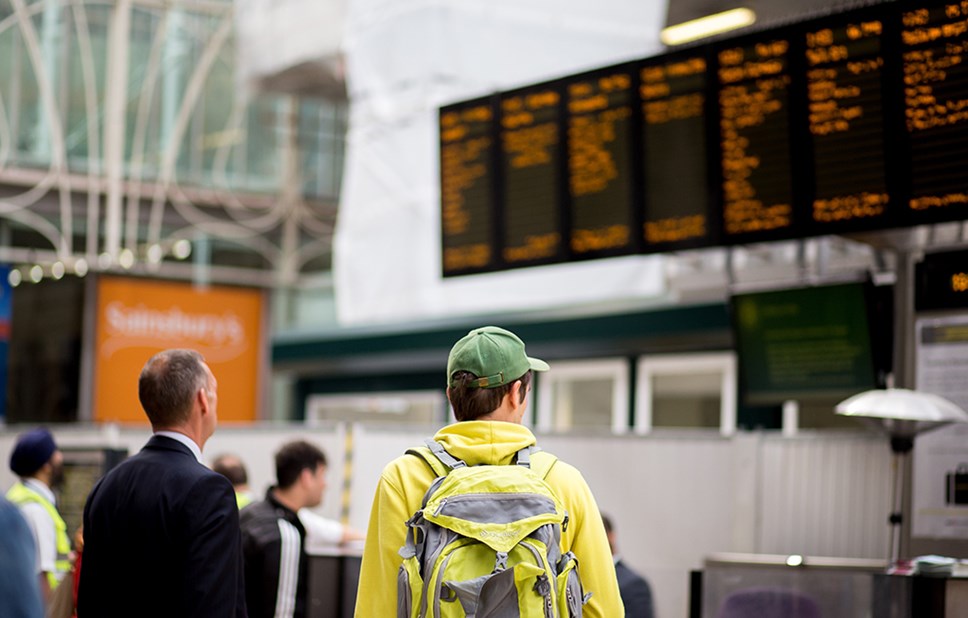
Great Western Railway launches consultation on modernising ticket sales
Proposals would see staff move from behind ticket office windows to help customers elsewhere on the station
Great Western Railway is consulting on proposals to move ticket office staff into other areas of the station where they can help more customers, as transactions at its ticket offices drop below 15%.
The consultations are happening as part of an industry-wide set of proposals that would mean ticket office staff would work on station platforms and concourses where they can be closer to customers. Subject to consultation, ticket offices could be phased out over a number of years.
A new role, based on the principle of station multi-skilled roles in place on the GWR network since 2007, would be created to allow staff to help more customers with a wider range of issues. Instead of being confined to just one area, these roles would be able to help customers in many more ways – including those with additional accessibility needs - wherever they are on the station.
It is a way of working already in place at some Great Western Railway stations, including Newbury and Reading Green Park stations.
Customers’ use of online and digital ticketing has accelerated over the past four years, and today, just 14.5% of GWR tickets are sold at ticket offices. The changes would align the rail industry with many other retailers, including banks, which have offered counter-free services for over a decade.
Our Passenger Assist programme – which helps disabled and mobility-impaired customers navigate stations and board trains – will not be affected by the changes. The proposals are designed to increase staff trained and available to help customers at stations across the network, including those with additional accessibility needs.
A spokesperson for GWR said:
“Digital tickets have made it easier and faster for customers to buy and manage tickets online, which means fewer people than ever are using ticket offices.
"With 85% of ticket sales taking place outside a ticket office on the GWR network, we think it makes sense to put our people where they can be most help to customers.
“This consultation is designed to allow the public to test and examine our proposals, and make sure our plans are compliant with the safeguards put in place at privatisation so that the needs of customers will still be met.”
For more information on how to take part in the consultation, visit: www.gwr.com/haveyoursay
Contact Information
Notes to editors
Notes to Editors
The RMT have been issuing talking points on social media prior to the details of our consultation being announced. Some of the assumptions they have made are not accurate. These include:
RMT Claim: “All ticket office staff will lose their jobs – they’ve been served with a section 188 notice of redundancy.”
We have not served any member of staff with a notice making them redundant.
A letter has been sent to trades union representatives outlining proposed changes that may potentially result in redundancies. It opens consultation with unions on ways of avoiding the dismissals, reducing the number of employees to be dismissed and mitigating the consequences of the dismissals.
These discussions would include transferring staff to the new roles, comprehensive retraining for other roles in the business and the potential for a voluntary leavers scheme. We want everyone who wants a job at GWR to continue to have one.
RMT Claim: “Customers who are disabled or have reduced mobility will no longer be able to get the help they need to get on trains.”
Ticket office staff – unless already in the more flexible kind of role we are looking to change to – are only able to work in the ticket office itself, and do not carry out our Passenger Assist activity, which is undertaken by trained platform and on-board staff.
The more flexible role we are proposing to move ticket office staff to would include helping less able customers use our trains and services. This means staff will be trained in more areas so they are better placed to help with a wider range of customer enquiries.
RMT Claim: “Ticket offices are just as busy as they used to be – look at this queue at this station…”
No one is suggesting that customers don’t use ticket offices at all, but we have reached a tipping point where the ticket offices and staff that used to support 85% of our customers’ transactions only look after 15% of them. That is a huge drop – and it has halved since the pandemic.
We want to put our staff where they can be most help to the travelling public.
RMT Claim: “This is just about private train companies cutting costs to raise profits.”
It is the taxpayer who will benefit from any long-term savings these proposals bring.
Train companies’ contracts with government are no longer linked to a percentage of profits. Instead, they are paid a small fixed fee, with penalties for not hitting pre-agreed targets.
